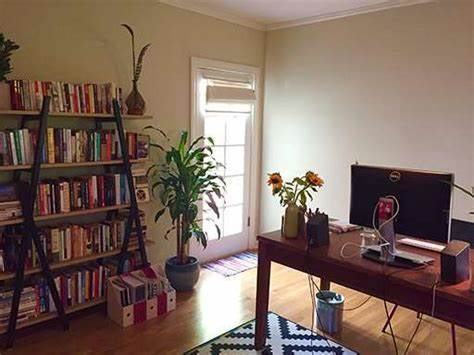Creating your ideal writing space
Creating your ideal writing space
Forget the notion of a flawless writing space, what matters
is the space that allows you to open your creative mind and affords you a place
to write without interruptions. Instead of fantasizing about the perfect
setup, why not bring it to life? Transform your current space into a motivational
haven where you can unleash your creativity. It's all about making your writing
space where you can feel you can create your next work of art without the daily
interruptions by family or friends.
Encouraging a Positive Writing Environment
Setting aside a designated writing area can be helpful. By
creating a space specifically for writing, you can train your brain to
associate that area with productivity. Just like how you might avoid certain
foods after getting sick from them, your brain can link your writing space with
feelings of creativity and accomplishing goals.
When you enter your writing space, try to cultivate a
positive mindset. Remind yourself that this is where you get to do what you
love - write. This positive association can make a big difference in how you
approach your writing. If possible, create a separate writing space away from
your usual hangouts. I even suggest having a door you can close to shut out
distractions and unwanted interruptions.
If your current writing space is also used for other
activities, consider decluttering and redesigning it to be a dedicated writing
zone. Removing distractions and creating a focused environment can help you
feel more successful and productive as a writer.
Let your creative juices flow by curating a space that
speaks to your soul. Surround yourself with items that ignite your imagination
and fuel your passion for writing. Whether you're drawn to the great outdoors
or prefer the cozy confines of your home, make your writing space a reflection
of who you are or who you want to be.
Embrace the beauty of nature by adorning your walls with
maps, rocks, feathers, and other treasures from your adventures. Let the sights
and sounds of the outdoors inspire your writing, even if you're stuck inside.
Seek inspiration from decorating blogs and create a space that is uniquely
yours.
I always suggest keeping the space as decluttered as
possible, but others suggest you have things in the room/area to create a cozy ambiance
like lighting, plants, bookshelves, blankets, and cozy chairs to relax in when you
can’t think anymore, but again I like simplistic in my writing area.
Finding the perfect writing space is crucial for both
productivity and well-being. It's not just about being creative; it's about
being comfortable too. Take a moment to consider your physical comfort while
you write. Sitting for extended periods can lead to discomfort and pain if
you're not careful.
If you're experiencing back or knee pain due to poor posture
or an uncomfortable chair, it's time to make a change. Investing in an
ergonomic chair can make a world of difference in your writing environment. It
will support your body and allow you to focus on your work without
distractions. So, treat yourself to a chair that will help you reach your
writing goals with ease.
Keep it simple and go minimalist! Fewer distractions mean more time for writing. Here are some tips to declutter your workspace:
Wall shelves for
storage
Desk with drawers
Organized cords
Designated spots for
daily items
Aromatherapy for a
calming atmosphere
Create a space that inspires you to write. Make it your own
and adapt it to your needs. Listen to your inner writer and make your space a
place where creativity can flourish.
Happy writing!
Elizabeth Kilbride is a Writer and Editor with forty years of experience in writing with 12 of those years in the online content sphere. Author of 5 books and a Graduate with an Associate of Arts from Pheonix University in Business Management, then a degree in Mass Communication and Cyber Analysis from Phoenix University, then on to Walden University for her master’s in criminology with emphasis on Cybercrime and Identity Theft and is currently studying for her Ph.D. degree in Criminology, her work portfolio includes coverage of politics, current affairs, elections, history, and true crime. In her spare time, Elizabeth is also a gourmet cook, life coach, and avid artist, proficient in watercolor, acrylic, pen and ink, Gouache, and pastels. As a political operative having worked on over 300 campaigns during her career, Elizabeth has turned many life events into books and movie scripts while using history to weave interesting storylines. She also runs 6 blogs that range from art to life coaching, to food, to writing, and opinion or history pieces each week.




Comments
Post a Comment